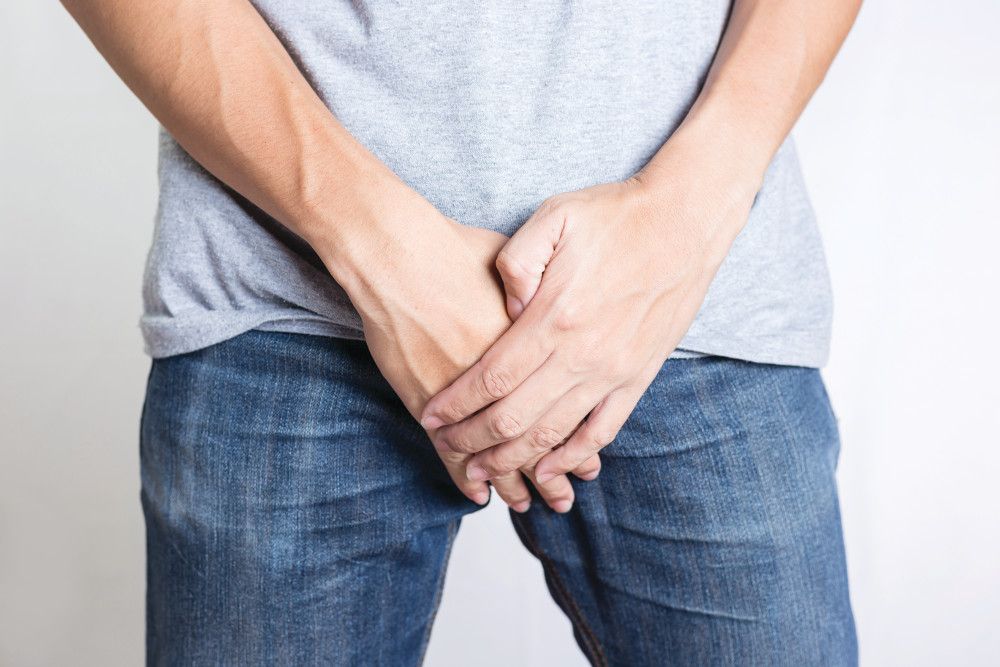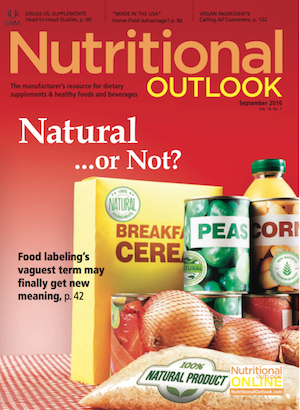Protecting the Fellows: Dietary Supplements for Prostate Health
Botanical ingredients for prostatic and urological health
Photo © iStockphoto.com/champja

Testosterone tends to dominate any conversation about male sexual function; there are, however, other forces driving men’s health. Prostate complications, acute and severe, are a growing problem and one that researchers continue to evaluate in terms of both supplementation and diet. Equally pressing are concerns regarding urinary tract infections (men get them, too).
Considering all the potential complications men face in prostatic and urological health, there’s money to be made in marketing natural formulas that can help. Luckily, the pursuit of plant-based ingredient solutions is an active one.
Plum Bark
A sizable market exists for African cherry (Prunus africana) in the men’s health space. Its bark is sold in extracts intended to help with benign prostatic hyperplasia (BPH), or an enlarged prostate. But concerns about over-harvesting1 the African cherry tree to meet global extract demand is motivating one ingredient supplier to explore a more sustainable alternative.
After carefully reviewing the contents of numerous other Prunus species, Cepham Inc. (Piscataway, NJ) and other parties discovered that the common plum (Prunus domestica) most closely resembles African cherry in its bark contents2, including key constituents such as beta-sitosterol and docosyl ferulate. Considering the strong similarities of the two barks, Cepham believes plum bark should act on the human prostate in much the same way African cherry bark does-by blocking the action of androgens and stimulating the death of benign prostate cells, among numerous other proposed factors.
So far, preliminary results are encouraging. Cepham funded an animal study that found plum bark as effective as African cherry bark in stopping the proliferation of BPH in rats3, and the company expects results of a human study to be published this November.
Unlike African cherry bark, which is typically wild-harvested, Cepham’s plum bark comes from privately managed plum tree farms at the foothills of the Himalayas. After farmers harvest their sweet fruits, the trees are pruned to stimulate more fruit production, and the byproduct of stems and branches becomes a bark extract.
Cepham is selling its plum bark extract (brand name Prosprune) to finished-product manufacturers in India and Thailand. The extract is available in paste form for soft gels and in powder form for hard gelatin capsules.
Cranberry
The tiny cranberry (Vaccinium macrocarpon) has made a name for itself in the urological field thanks to years of cultural use for treating urinary tract infections (UTIs). A large number of studies have since explored, and sometimes validated, the use of cranberry extracts for this condition. Although women are most prone to UTIs, men are also at risk of UTIs and, more commonly, lower urinary tract symptoms (LUTS), which can be caused by infections or prostate problems. Fortunately, cranberry may provide relief for LUTS.
In a “landmark study”4 published earlier this year, Naturex (South Hackensack, NJ) says its cranberry extract reduced LUTS in men over age 45. It appeared to improve urinary flow, international prostate symptom scores (IPSS), and other relevant health markers also used in pharma-level studies. According to Naturex, this is the first and only gold-standard study (randomized, double-blind, placebo-controlled human clinical) on cranberry and LUTS.
A lot of cranberry research has focused in narrowly on proanthocyanidins (PACs), chemical compounds present in these berries that experts say are highly responsible for positive results. Naturex, however, remains intent on marketing a full-spectrum cranberry extract that it says is biologically and clinically superior for urological health. The extract is sold as Flowens.
Tea
Although green tea (Camellia sinensis) and its fermented black variety are often the subject of prostate cancer studies, results have historically been inconsistent. Kemin (Des Moines, IA) is one supplier taking a different approach to tea and prostate health.
With the help of two clinical trials, Kemin is promoting AssuriTEA, a blend of green and black tea extracts already associated with improvement in LUTS, bladder emptying, and other sexual and non-sexual health factors in men. Though no additional trials are currently under way, Kemin says it is still seeing a gradual increase in global sales of its ingredient, thanks in part to its AssuriTEA science and the white space Kemin says still exists in this health category.
Aside from green and black tea’s nutrient profiles, AssuriTEA is further distinguished by its proprietary blend of antioxidants and other phytonutrients. Kemin says the formula provides antioxidant and anti-inflammatory properties that benefit men.
STORY CONTINUES ON PAGE 2
Flower Pollen
It isn’t just bark, fruits, and leaves that garner attention for prostate health. Some flowers show prostate potential, too. Take diminutive rye grass flowers (Secale cereale). Every year, farmers extract from them a pollen deemed safe for human use and sold in dietary supplements throughout the world.
What makes rye flower pollen appealing for men is its anti-inflammatory properties and its ability to act against androgens in the body. Such benefits are associated with reductions in chronic pelvic pain, also known as chronic prostatitis, which have been documented in past5 and ongoing6 human clinical trials on flower pollen extracts. But although subjects have experienced prostatic pain relief with flower pollen extract, manufacturers should be aware of the varying quality of flower pollen in supply today.
Graminex (Saginaw, MI), an established supplier of rye grass pollen extract, says that seasonal changes in moisture and pollen density, for instance, can create differences in pollen properties throughout the year. To keep its extracts standardized, Graminex maintains its own internal seed breeding and field management practices.
The market for flower pollen extracts is not new, but changing consumer behaviors are influencing the ways in which these extracts are sold. To that effect, Graminex offers a variety of extracts suitable for different needs, including chewables and beverages.
Lycopene
Lycopene, from which tomatoes get their red color, is no stranger to prostate-related research. The antioxidant has been studied for its potential use against prostatitis, prostate cancer, and associated conditions. But there’s no reason to limit such research to lycopene by itself.
In an ongoing attempt to find the most synergistic blends of lycopene and other nutritional ingredients, Lycored (Be’er Sheva, Israel) recently introduced a prostate health composition called Lycopro. The combination of lycopene, zinc, curcumin, and omega-3 was inspired by a six-month trial7 that deemed the ingredient blend effective for reducing prostate size. It’s also based on what Golan Raz, vice president of health nutrition at Lycored, calls “indication-specific nutritional technology” intended to ensure the most accurate ratios and potency of ingredients in Lycored nutrient complexes.
Lycopro is part of a much larger portfolio of lycopene formulations intended for men and women. A lycopene sport product, which might complement Lycopro for the male market, is currently in development.
Fun Fact: Waste Not
Prostate support may not necessarily require the freshest ingredients. A team of researchers in China found that the catechin contents of green tea waste (left over from tea making) inhibited prostate cancer cell growth in vitro. The study, “Preparation of catechin extracts and nanoemulsion from green tea leaf waste and their inhibition effect on prostate cancer cell PC-3,” was published in the International Journal of Nanomedicine in May.
Also read:
Beyond Testosterone: Men’s Health and Dietary Supplements
Men's Ingredients for Prostate and Testosterone Health
Nutritional Ingredients for Men's Health
References:
- Bodeker G et al., “Prunus africana (Hook.f.) Kalkman: the overexploitation of a medicinal plant species and its legal context,” Journal of Alternative and Complementary Medicine, vol. 20, no. 11 (November 2014): 810-822
- Jena AK et al., “Amelioration of testosterone induced benign prostatic hyperplasia by Prunus species,” Journal of Ethnopharmacology. Published online May 24, 2016.
- Swaroop A et al., “Safety and efficacy of a novel Prunus domestica extract (Sitoprin, CR002) on testosterone-induced benign prostatic hyperplasia (BPH) in male Wistar rats,” Toxicology Mechanisms and Methods, vol. 25, no. 9 (November 2015): 653-664
- Vidlar A et al., “Cranberry fruit powder (FlowensTM) improves lower urinary tract symptoms in men: a double-blind, randomized, placebo-controlled study,” World Journal of Urology, vol. 34, no. 3 (March 2016): 419-424
- Tommaso C et al., “Pollen extract in association with vitamins provides early pain relief in patients affected by chronic prostatitis/chronic pelvic pain syndrome,” Experimental and Therapeutic Medicine, vol. 8, no. 4 (October 2014): 1032-1038
- ClinicalTrials.gov Identifier: NCT00919893
- Schwarz S et al., “Lycopene inhibits disease progression in patients with benign prostate hyperplasia,” The Journal of Nutrition, vol. 138, no. 1 (January 2008): 49-53

Prinova acquires Aplinova to further increase its footprint in Latin America
April 7th 2025Prinova has recently announced the acquisition of Brazilian ingredients distributor Aplinova, which is a provider of specialty ingredients for a range of market segments that include food, beverage, supplements, and personal care.

























